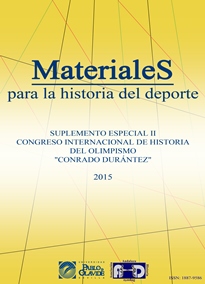Olympic valencianos that stayed on the road
Keywords:
Olympic Games, Franco regime, athletics, history of sport, sport and authoritarianism, José Lacomba.Abstract
The life of a series of Valencian athletes who, for various reasons, despite having made the due merit and obtain trademarks or posts required to participate in the Olympics but finally did not come, serve as a leitmotif to understand the vicissitudes, inequalities and contradictions of the Spanish sport system over nearly 50 years (1928-1976), a period that largely coincides with the Franco dictatorship. The study was carried out by using qualitative methodology based on interviews with the protagonists themselves or their relatives, which was completed with the use of newspaper sources (analysis of the written press of the time) and documentary collection and federative personal files. Five are the athletes that a number of circumstances prevented them from reaching the Olympic wound. In chronological order: José Hernandez, Spanish runner-up in 1928 in the marathon of Barcelona, nominated to represent Spain at the Olympics in Amsterdam; José Lacomba Spanish champion in long, triple and height jump, including the records of Spain who could have gone to the Berlin Games; José Blay, Spain marathon champion, eighth best mark of the year, and selected for the London Games in 1948; Emilio Ponce, Spain record holder of 100 yards and 4x100, selected for the Olympics in Melbourne, and finally José Luis López Peris, tree times champion of Spain in 400 meters and minimum at this distance for the Montreal Games in 1976. We try to value the relevance of these athletes in order to dignify and record their figures and make known the vicissitudes which crossed in their careers. The biography of these five athletes shows that their exclusion from the Olympic Games was due to various reasons. On some occasions influenced the lack of personal resources for the trips, others were decisive ideological commitments, personal jealousies, the potential loss of prestige of the brand Spain, changes in criteria by the Spanish athletics federation and class conflict.
Downloads
References
Agulló, Recadero. Historia del Atletismo Valenciano. Valencia: Generalitat Valenciana, 1985.
Agulló, Recadero. Las carreras populares en la provincia de Valencia (1810-1989). València: Diputació de Valencia, 1990.
Agulló, Recadero. Un siglo de atletismo valenciano (1907-2008). De los primeros andarines al mundial de atletismo. València: Comité Organizador del Campeonato del Mundo de Atletismo en Pista Cubierta València 2008, IAAF World Indoor Championships Valencia, 2008.
Agulló, Recadero; Agulló, Víctor; Corell, José. Mestre, Juan Antonio. Valencia capital europea del deporte 2011. Una visión histórica del deporte popular valenciano (1868-2011). València: Ajuntament de València, 2011.
Agulló, Recadero y Agulló, Víctor. “El deporte en la ciudad de Valencia, capital de la República Española (1937)”, Comunicación presentada en el III Congresso História e Desporto: O Desporto em Tempo de Guerra. Universidade Nova de Lisboa, 2014.
Bahamonde Magro, Ángel. “La escalada del deporte en España en los orígenes de la sociedad de masas, 1900-1936”. En Pujadas, Xavier (Coord.), Atletas y ciudadanos: historia social del deporte en España, 1870-2010, Madrid: Alianza Editorial, 2011, 89-119.
Cagigal, José María. El deporte en la sociedad actual. Madrid: Magisterio Español, 1975.
Escamilla, Pedro. De Atenas a Roma (Historia breve del atletismo olímpico), Madrid: Delegación Nacional de Educación Física y Deportes, 1960.
González Aja, Teresa. “La política deportiva en España durante la República y el Franquismo”. En González Aja, Teresa (coord.), Sport y autoritarismos. La utilización del Deporte por el Comunismo y el Fascismo, Madrid: Alianza Editorial, 2002, 169-202.
González Aja, Teresa. ““Contamos Contigo”. Sociedad, vida cotidiana y deporte en los años del desarrollismo, 1961-1975”. En Pujadas, Xavier. (Coord.), Atletas y ciudadanos: historia social del deporte en España, 1870-2010, Madrid: Alianza Editorial, 2011, 323-353.
Lagardera Otero, Francisco. (1995). “Notas para una historia social del deporte en España”, Historia de la educación: Revista interuniversitaria, nº14-15, 1995, 151-172.
Meyer, Gastón. El Atletismo, Madrid: Comité Olímpico Español, 1963.
Perarnau, Martí y Muntaner Díaz, Emilio. El libro negro del atletismo español, Barcelona: Amaika, 1975.
Pujadas i Marti, Xavier. Atletas y ciudadanos: historia social del deporte en España, 1870-2010. Madrid: Alianza Editorial, 2011.
Pujadas, Xavier; Garai, Beatriz; Gimeno, Fernando; Llopis, Ramón; Ramírez, Gonzalo y Parilla, José Manuel. “Mujeres y deporte durante el franquismo (1939-1975): estudio piloto sobre la memoria oral de las deportistas”, Materiales para la historia del deporte, nº 10, 2012, 37-54.
Salvador, José Luis. El deporte en Occidente. Historia, Cultura y Política, Madrid: Cátedra, 2004.
Santacana Torres, Carlos. “Espejo de un régimen. Transformación de las estructuras deportivas y su uso político y propagandístico, 1939-1961”. En Pujadas, Pujadas, Xavier (Coord.), Atletas y ciudadanos: historia social del deporte en España, 1870-2010, Madrid: Alianza Editorial, 2011, 205-232.
Shaw, Duncan. Fútbol y franquismo, Madrid: Alianza, 1987.
Simón-Sanjurjo, Juan Antonio. Deporte y política exterior durante el franquismo: El papel del Ministerio de Asuntos Exteriores de España siguiendo el Movimiento Internacional del Boicot a Sudáfrica durante los JJOO de México. Agora para la EF y el Deporte nº15 (3), 2013, 165-179.
Periódicos consultados
El Mercantil Valenciano
Levante
Las Provincias
Jornada
Downloads
Published
Issue
Section
License
Authors who submit to this journal agree to the following terms:
- Author(s) keep copyright and guarantee to the journal the right to be the first publication of the work as licensed under Creative Commons Attribution-Noncommercial-ShareAlike 4.0 International as initial publication in this journal.
- Author(s) can establish additional agreements for non-exclusive distribution of the version of the work published in the journal (for example, to an institutional archives or to publish it in a book), with an acknowledgment of its initial publication in this journal.
- It is allowed and authors are encouraged to disseminate their work electronically (e.g, in institutional open archives or on their own website) before and during the submission process, as it can lead to productive exchanges, as well as a citation earlier and more of published work (See the Effect of Open Access).












